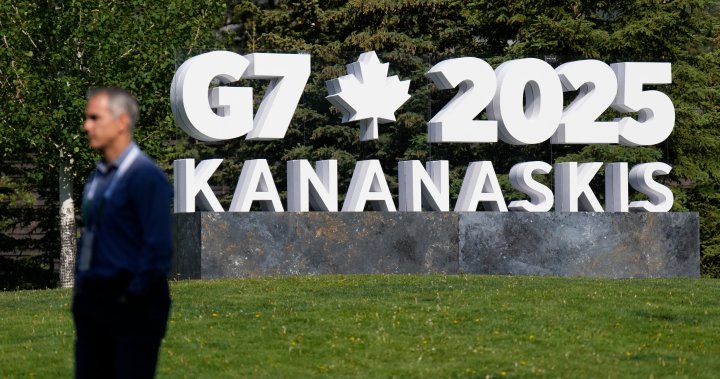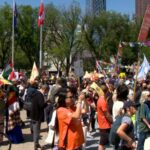Hundreds gathered at Calgary’s Municipal Plaza yesterday, unfurling banners and raising voices in what marked the first major demonstration ahead of this week’s G7 Summit. The protest brought together an unexpected coalition of environmental activists, labor unions, and indigenous rights groups – all united in their message to world leaders who’ll soon descend on Kananaskis Country.
Standing among the crowd, I couldn’t help but notice the diversity of participants. Calgary’s typical protest scene gained new dimensions, with students mingling alongside veterans of political activism. The atmosphere shifted between festival-like camaraderie and moments of intense political messaging.
“We’re not just here to oppose – we’re here to propose real solutions,” said Martha Connelly from Climate Justice Calgary, her voice barely carrying over the drumming circle that had formed near the Famous Five statues. “These seven leaders represent economies that have contributed disproportionately to global emissions while communities worldwide suffer the consequences.”
The demonstration remained peaceful throughout, with Calgary Police Service maintaining a visible but measured presence. Officers I spoke with confirmed no arrests had been made, though security measures throughout downtown have noticeably intensified as the summit approaches.
For many Calgarians, this marks a return to the international spotlight not seen since the 2002 G8 Summit, also held in Kananaskis. That meeting occurred less than a year after the September 11 attacks, amid heightened security concerns that effectively isolated protesters from world leaders.
“Last time, they kept us so far away we might as well have been protesting in Edmonton,” remarked Thomas Gill, who attended both events. “At least this time we’re visible in the city, though I doubt Trudeau or Biden will see us from their helicopters when they fly into K-Country.”
The Alberta Federation of Labour contingent arrived with perhaps the most targeted message for Canadian officials. Their representatives criticized what they called “performative politics” around just transition policies while actual support for oil and gas workers remains insufficient.
“The green economy promises are great until you realize there’s no concrete plan for the thousands of families who depend on traditional energy jobs,” said Mariah Thornton, who drove in from Fort McMurray with several colleagues. “We want climate action, but we also need to put food on our tables.”
City officials have spent months preparing for both the summit and associated demonstrations. The economic impact of hosting such a high-profile international event comes with the logistical challenges of security, transportation disruptions, and accommodating various expressions of democratic freedoms.
According to the Calgary Police Service, additional demonstrations are expected throughout the week, with the largest anticipated for Thursday when leaders officially begin their meetings. Temporary road closures and security checkpoints have already appeared throughout downtown, with significantly more restrictions implemented in Kananaskis itself.
Indigenous leaders formed a particularly powerful presence at yesterday’s gathering. Representatives from Treaty 7 Nations expressed frustration at their limited inclusion in summit discussions despite the event taking place on traditional territories.
“They’re meeting on our lands to discuss our futures without meaningful consultation,” said Elder Margaret Running Wolf. “This pattern of exclusion is exactly what these protests are about – decisions affecting billions made by a privileged few.”
The demonstration concluded with organizers announcing plans for a larger mobilization on Thursday, encouraging participants to return with “even more friends, family, and colleagues.”
For many downtown businesses, the protests and security measures present a complex economic equation. Some restaurants near the plaza reported higher-than-usual Monday sales as protesters sought refreshment, while others noticed regular customers staying away due to perceived inconvenience.
“It’s been strange – we had a rush around noon like nothing we’ve seen on a Monday, but our regular afternoon crowd didn’t show,” said Jerome Martinez, manager at a café facing the plaza. “Overall though, anything bringing attention to Calgary businesses is probably good in the long run.”
As international media begins arriving to cover the summit, these demonstrations offer a counternarrative to the carefully orchestrated diplomatic proceedings. For protesters, that’s precisely the point.
“They’ll release their communiqué with pretty words about cooperation and progress,” said university student Aiden Williams, attending his first major protest. “But out here is where real people are demanding that those words actually mean something.”
With three days until leaders arrive, Calgary finds itself navigating this delicate balance of security, free expression, and international diplomacy – a challenge that will define our city on the world stage this week.







